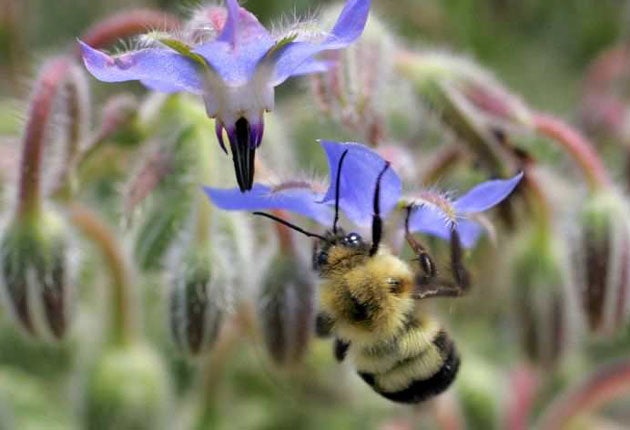Buzz off, we're taking it easy, bees tell scientists
Research shows some insects belie their reputation and won't go foraging for food until supplies run out

We have all been conned. Even the name suggests industry: the worker bumblebee is, we thought, the epitome of effort as it buzzes around, foraging for food. But now research has revealed that, far from striving tirelessly for the good of the colony, bees are as prone to slacking as the rest of us when they can get away with it.
Scientists at Queen Mary, University of London, discovered that some bumblebees have a tendency to ignore promptings to go out to get food, choosing to rest instead if there is even a tiny amount of food in their store.
Dr Nigel Raine and his colleague Dr Mathieu Molet studied how bees make sure they have enough food for their needs. They found that the insects use a sophisticated system to decide whether they need to go out to work or whether they can afford to take it easy.
Bumblebees returning with a large amount of food give off a chemical signal, a pheromone, designed to excite the others and persuade them to rush out to take advantage of good food supplies.
But the message is not always heeded. "The bees are doing really quite complicated things: assessing how much food they have, looking in the larder to see whether they have got to go out get more," Dr Raine said. "It's like 'Oh no, I've got to go to Sainsbury's'."
He added: "If they go out and don't find stuff quickly, they just return to the nest and say: 'Things aren't looking so good today.' The ones who are less successful will wait for another forager to come back and give them more information about where to look.
"If there isn't stuff to collect, a lot of them are pretty much on standby. They will be sitting around doing very little, or apparently so."
The researchers, who have published a paper outlining their research in the journal Behavioural Ecology and Sociobiology, studied colonies in a laboratory using tiny electronic RFID tags – used on clothes to prevent shoplifting – which were fitted to the bumblebees to record when they left the nest to look for food.
Several colonies were then stocked with different levels of food. Artificial pheromones, mimicking the bees' chemical communication system, were used to stimulate the inhabitants, and more than 16,000 foraging trips were monitored.
They found the bees often displayed a relaxed attitude towards food when supplies were plentiful, and only when the number of full honeypots fell below 5 per cent did the insects start living up to their reputation for being "busy", with an 80 per cent rise in foraging.
Dr Raine said it was not that bumblebees are lazy, but that a reasonably relaxed strategy had evolved as the best way to gather food while conserving energy. "They are busy when there is work to be done," he said.
The scientists stressed that this is not just esoteric insect research: understanding what motivates the bees could be used to increase their effectiveness as pollinators of commercial crops, such as tomatoes.
Join our commenting forum
Join thought-provoking conversations, follow other Independent readers and see their replies
Comments
Bookmark popover
Removed from bookmarks